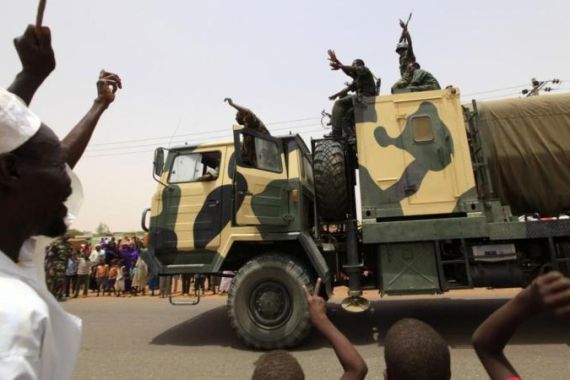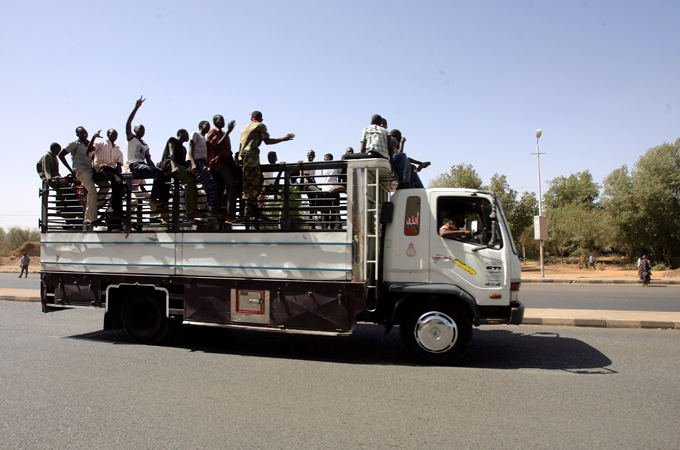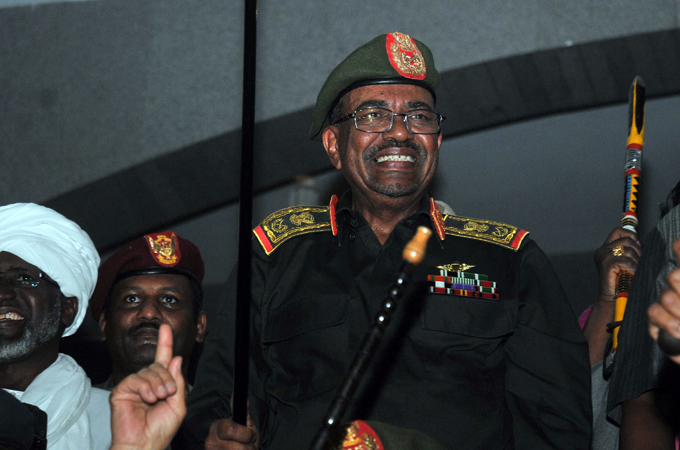Sudan’s students drop books for guns
The country’s ruling party has mobilised young men to take breaks from their studies and battle rebel militias.

Khartoum, Sudan – Ahmed Ehemir balances two large plates stacked with pancakes on a tea table at the headquarters of Sudan’s national students’ association. “This is our breakfast,” he said, a good-natured grin lighting up his young face.
Two weeks ago, Ehemir was fighting rebel militias in Abu Kershola town in South Kordofan – a province bordering South Sudan which, since the end of April, has been the theatre of intensive fighting between rebel forces and government troops. He spent one month fighting alongside the regular army and the Popular Defense Forces (PDF), a militia backed by the regime.
Keep reading
list of 4 items‘Triple spending’: Zimbabweans bear cost of changing to new ZiG currency
‘We share with rats’: Neglect, empty promises for S African hostel-dwellers
Thirty years waiting for a house: South Africa’s ‘backyard’ dwellers
Ehemir was part of the mujahidin, a volunteer paramilitary group composed mostly of students “and a few high-school pupils, all very brave fighters”, he said.
With some “brothers” from the hardline Student Islamic Movement, the university branch of the ruling National Congress Party (NCP), Ehemir answered the General Student Union’s appeals to join what he describes as a religious and ideological war.
 |
| Officials within Sudan encourage students wage jihad [AFP/Getty] |
“We want to spread Islam all over the country. We want freedom,” Ehemir told Al Jazeera. “The rebels, the United States, Europe – these are our enemies, but we will not give up Sudan to our enemies.”
His discourse somehow sounds both rehearsed and inspired. It is a muddle of ideological, political and religious slogans, a verbatim compilation of the propaganda that floods the state-controlled media.
Students have been the main target of mobilisation by both the government and rebel forces. But following an energetic offensive in April by the Sudan Revolutionary Front – a coalition of rebel groups – the government stepped up its recruitment campaign.
The media, imams and state governors compel young men to join the so-called jihad, and recently the Council of States, Sudan’s upper house of parliament, suspended its sessions to let its members set up mobilisation efforts in their constituencies.
University recruitment
In universities, students sympathetic to the NCP organise “recruitment festivals” with music and songs. Students periodically arrive in military uniforms and run around campus to encourage others to enroll.
“The language used is increasingly racist against the populations of Darfur, Blue Nile and other regions,” said Abdelaziz, a recent graduate of Khartoum’s Neelain University and a member of the Darfurian Students’ Association, a national group that advocates for the rights of students from Darfur in Sudan’s west. He asked that only his first name be used for security reasons.
From the field in Abu Kershola, the president of the General Student Union, Mohammad Salah, demanded that student groups loyal to the rebels be banned from practising political activities – a wish that was immediately granted by the regime on June 1.
It's very easy to shoot someone. If I gave you a gun, right here and now, you could kill me.
Another change, according to Abdelaziz, is the enrollment of students not only in the PDF’s student section and the mujahidin, but also in the National Intelligence and Security Services (NISS).
“The last time [the NISS] accepted students within its ranks was for the battle of Heglig in 2012,” said Abdelaziz, referring to an oil-rich region claimed by both Sudan and South Sudan. “This proves that the government feels exceptionally threatened and is trying to gather up as many troops as it can.”
On May 20, at Darfur’s El Fasher University, 41 members of the NCP’s student branch arrived on campus for a “festival”, seven of them armed with Kalashnikov assault weapons.
“When people protested and chanted anti-war slogans, the NCP students replied by bringing in a pick-up truck full of rifles and handguns,” said Mirhab, a student who witnessed the confronatioan who gave only one name. Nine students were reported to have been wounded in ensuing violence.
Beyond the zeal of a few NCP students, however, it is hard to tell whether mobilisation efforts at universities are actually fruitful.
“Absolutely not,” said Professor Issam Aw Mohammed, an economist at Khartoum’s Nilein University. “Most of the students who dance and chant during festivals don’t actually go to the training camps. The few who do hear so many frightening rumours that the following morning, instructors are faced with empty beds. It has become a running joke.”
Student volunteer groups are sent to the front-line for a period of up to three months, with between 15 to 100 students per university.
 |
| Sudanese President Omar al-Bashir takes part in a ceremony celebrating the army taking back Abu Kershola town [AFP] |
“The Student Union’s Jihadist Unit keeps a register of the mujahidin and student PDF fighters’ names, departure and return dates, as well as the weapons they used,” said Ahmed al-Tayeb, the Union’s media relations officer. The Popular Defence Forces also has a copy of the register.
Since the end of April, 380 students from across the country have gone to fight in Abu Kershola and, according to Tayeb, “many more wanted to join”.
“As always, those with the most experience were given priority,” he said.
Unlike their PDF counterparts who are paid, mujahidin simply receive a certificate that they can add to their “application” to go back to the front-line. Some of Ehemir‘s friends have enrolled in fighting as many as four times.
Sent to the ‘slaughterhouse‘
To ensure that student jihadists do not neglect their studies, the union’s Jihadist Unit has even negotiated with universities to create a special examination timetable.
The spokesman of the Ministry of Higher Education, Osama Mohamed Awadh, told Al Jazeera the ministry fully supports the mobilisation efforts in universities and “urges students to go on jihad, which is a duty and a necessity”.
“If young people wish to defend their homeland, then we must not go against their wishes,” Awadh said.
Those who enroll in the mujahideen or PDF without having yet completed the military service required by the Sudanese government are sent to PDF training camps for a minimum period of two weeks. “We learn how to use Kalachnikovs … and RPGs,” said Ehemir.
Those who did their military service are not required to undergo extra training, which means some can be sent to the front-line without having fired a weapon in years.
Yet Ehemir said he believes that dangerous incidents caused by poor training are infrequent. “Once you’re there, you learn. It’s very easy to shoot someone. If I gave you a gun, right here and now, you could kill me,” he said with a laugh.
The regular army, which is stretched on many fronts, needs reinforcements on the new battleground in North Kordofan province and the northern part of South Kordofan.
But for Professor Mohammed, deploying undertrained students is “a terrible waste”.
“The rebels are excellent fighters with better knowledge of the terrain. Only the Janjaweed mercenaries could wipe them out, but they have long disbanded and grown hostile to the government,” he said.
On the field, the mujahidin and PDF often conduct assaults before the regular army – causing the death toll among militiamen to often be much higher than that of the Sudanese Armed Forces.
“The army dislikes the PDF and mujahidin, which they consider unruly mercenaries,” explained Mohammed. “So they send them in as bait, and then finish off the work. Basically, our students are sent to the slaughterhouse.”
The Sudanese military did not respond to repeated requests for comment.
Four of Ehemir‘s close friends were killed in Abu Kershola. “Wagid was shot right in front of me. He was a very good person, and was about to graduate this year. I am so sad about him.”
For a moment, Ehemir‘s features soften and he looks again like the young man who brought in the pancakes. A moment later, however, he is adamant about his cause. “If they need me again, I will go back,” he said.